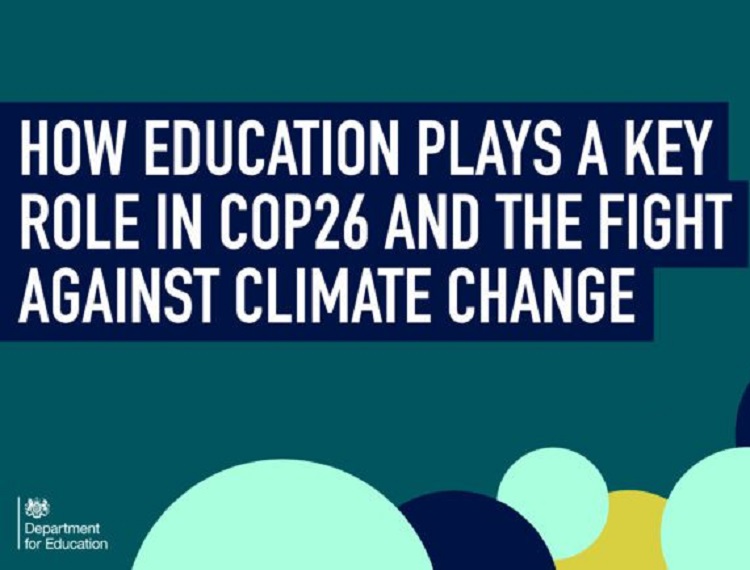How education plays a key role at COP26 and in the fight against climate change

#OneStepGreener – The #COP26 climate change conference is being hosted in Glasgow (31 OCT – 12 NOV 2021), with leaders from across the globe, joining to discuss ways to combat the effects of climate change.
Ian McIlwain, Director of Development & Partnerships at FutureLearn said:
“Climate change is a worldwide issue of the utmost urgency that cannot be solved without access to the right information, the right tools, and the right skills. Education has a vital role to play in this – we will always need the brightest of academic minds forging the way towards new sustainable solutions, but we also need to make that knowledge far more accessible to people on a global scale. There is an ever urgent imperative to enable each corner of the world to learn how we as both individuals and organisations can continue to play our part in pushing for climate action, as well as understanding how we can each take steps towards a greener future.
“At FutureLearn, we are dedicated to increasing access to education in order to build a better world for all. We aim to play our part, both now and beyond the COP26 summit, by building the world’s most comprehensive online climate curriculum on one platform. This is an ambitious goal that we’re already well on our way to achieving by partnering with a number of the world’s leading learning institutions and organisations in the field, from the Open University, to Samsung, the National Oceanography Centre, the Universities of Edinburgh and Exeter, Institut Français de la Mode and more.”
 Simon Carter, Director at RM:
Simon Carter, Director at RM:
“It’s crucial that schools use this week’s COP26 conference to kickstart a dialogue between staff and students about how to prepare for a greener future. Where snow days and heatwaves were once thought of as one-off, uncommon weather gift for pupils, the figures published by the London mayor’s office this summer warning that “a fifth of London’s schools are now susceptible to flooding” demonstrated just how catastrophic weather conditions could be for schools without a continuity plan in place.
“For educators, then, the environmental challenges faced are now twofold. On the one hand, schools should be readying themselves for the possible consequences of climate change, with disruption to their normal mode of teaching, by making hybrid learning part of their new normal. Secondly, school staff should consider what actions they can take themselves – for example, because on-site computer server rooms are hot and consume a lot of energy, can a school move to a serverless, cloud-based network instead? And, do worksheets need to be printed off for pupils, or can they be completed online? Do tests and assessment need to be undertaken in printed format, or can they be done digitally?
“Neither challenge can be underestimated, but both rely on having the best education technology, and virtual communication technology, in place to guide informative and interactive discussion around today’s United Nations’ conference– both at schools and at home. Whether it’s a case of building a robust continuity plan in the case of a tricky environmental issue, or building a more digitally savvy community of students and staff to champion initiatives the whole school can be proud of, recognising the critical role that technology can play within our education system.”
Live from Glasgow ?
Watch the #COP26 Opening Ceremony live ?#TogetherForOurPlanethttps://t.co/btmQk6qYrd
— COP26 (@COP26) November 1, 2021
The UK government will be taking a leading role in this conference, with the Department for Education leading the conversation on how to fight climate change through education, as part of an international effort to reduce carbon emissions and protect our planet.
What role does Education play in supporting positive climate action?

22nd Oct 2021: Education is a vital tool in raising awareness and equipping future generations with the skills and knowledge needed to tackle climate change.
Starting from primary school, pupils in the UK are taught about the effects and causes of climate change, with GCSE students later studying the environment as part of the science, citizenship, and geography curriculum. Over 140 universities have now committed to proactively tackling climate change, as we champion green skills as a cornerstone of post-16 education.
The engagement shown by young people in this struggle is so important, and we want to nurture this passion through learning. By sharing our practices with other nations, we’ll be influencing environmental global action through education.
So what will we be doing at COP?
Building a more sustainable future is central to our plans as we build back better from the pandemic. Education is key to this goal, and Education Secretary Nadhim Zahawi has made clear that we want our nurseries, schools colleges and universities to be cleaner and greener.
At this year’s COP26 conference we’ll be working with departments across government, to lay out our vision to education and environment ministers from across the globe, on how to further integrate sustainable development into education, and engage young people in climate education.
As the host nation, COP26 provides a unique opportunity for the UK education sector to showcase its role in positively responding to climate change and inspiring and calling on international partners to act. Through this, the UK is helping to drive forward a global agenda to prepare the next generation to respond to climate change, and to ensure that the voices of our leaders, teachers, and young people are heard.
Calling all Education and Environment Ministers to pledge for change!
We know that young people are the leaders of tomorrow, which is why we want our world class education system to be a leader in tackling climate change through education, as we encourage our international partners to do the same.
At COP26, the UK in partnership with Italy, UNESCO and youth partners Mock COP and Youth4Climate will lead the way by bringing together Education and Ministers responsible for climate change from around the world. This summit marks an unprecedented opportunity for greater international links between education and the environment ministries, as part of a collective effort to empower citizens to take climate action and create real change.
How can you get involved?
The fight for a more sustainable future starts with you and your community, which is why it is so important that you get involved and help us make a positive impact on our environment. The changes start with all of us which is why we’re asking you to get involved through the #OneStepGreener campaign.
We could all do more to tackle climate change, whether that’s through organising a local litter picking event in your community, or just being more mindful of what we eat.
Visit the website to see how you could get involved, and don’t forget to show us how you’re going #OneStepGreener.











Responses